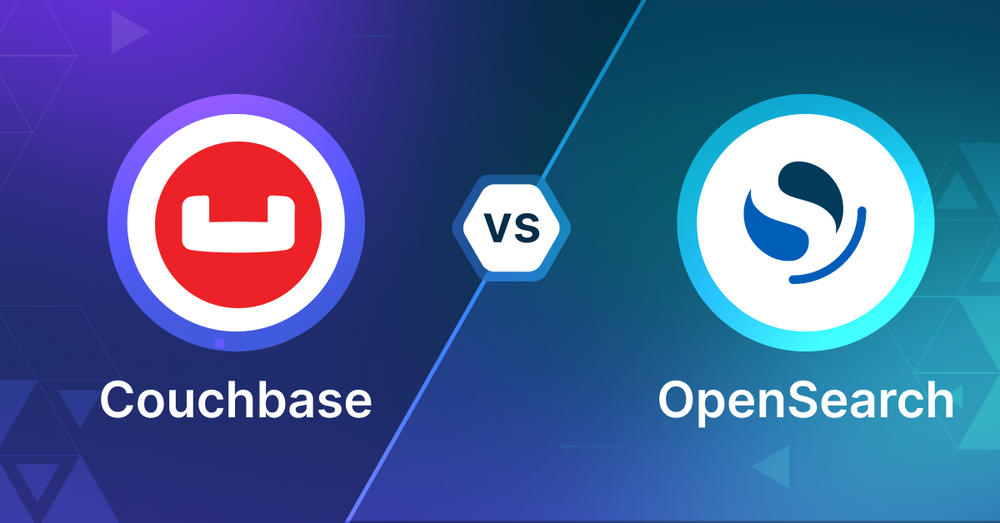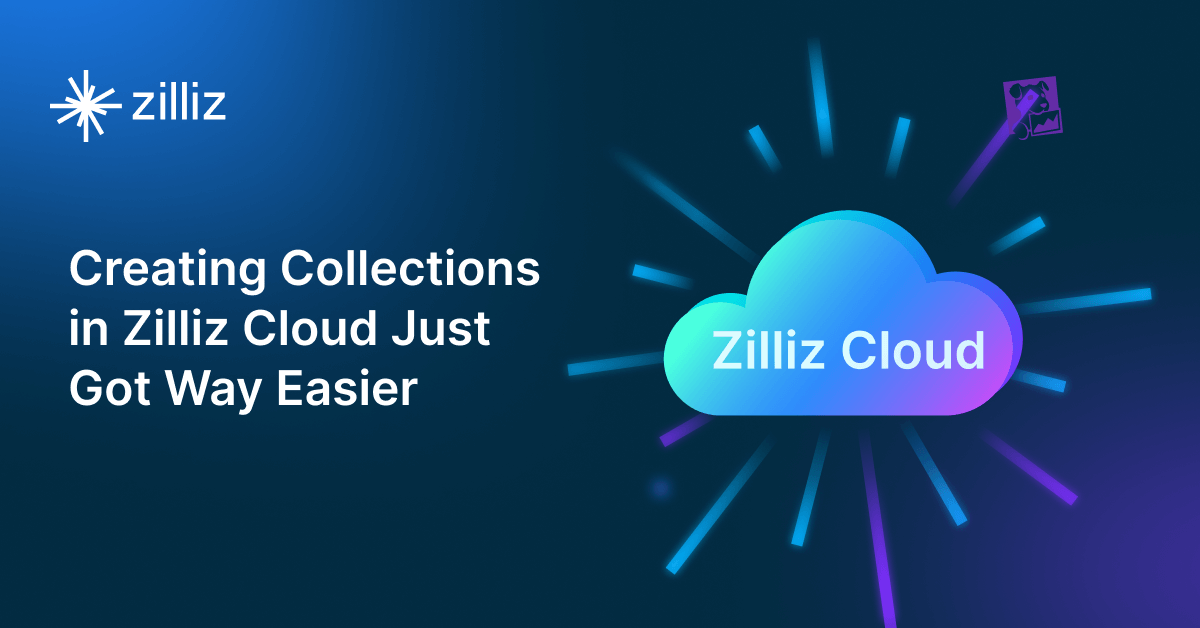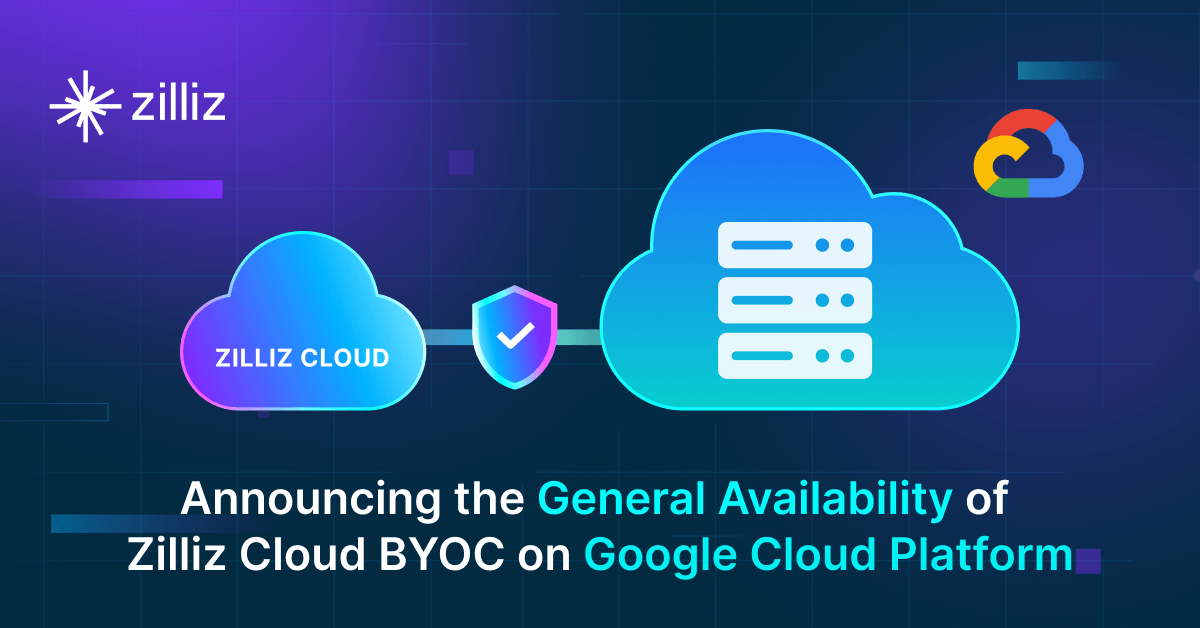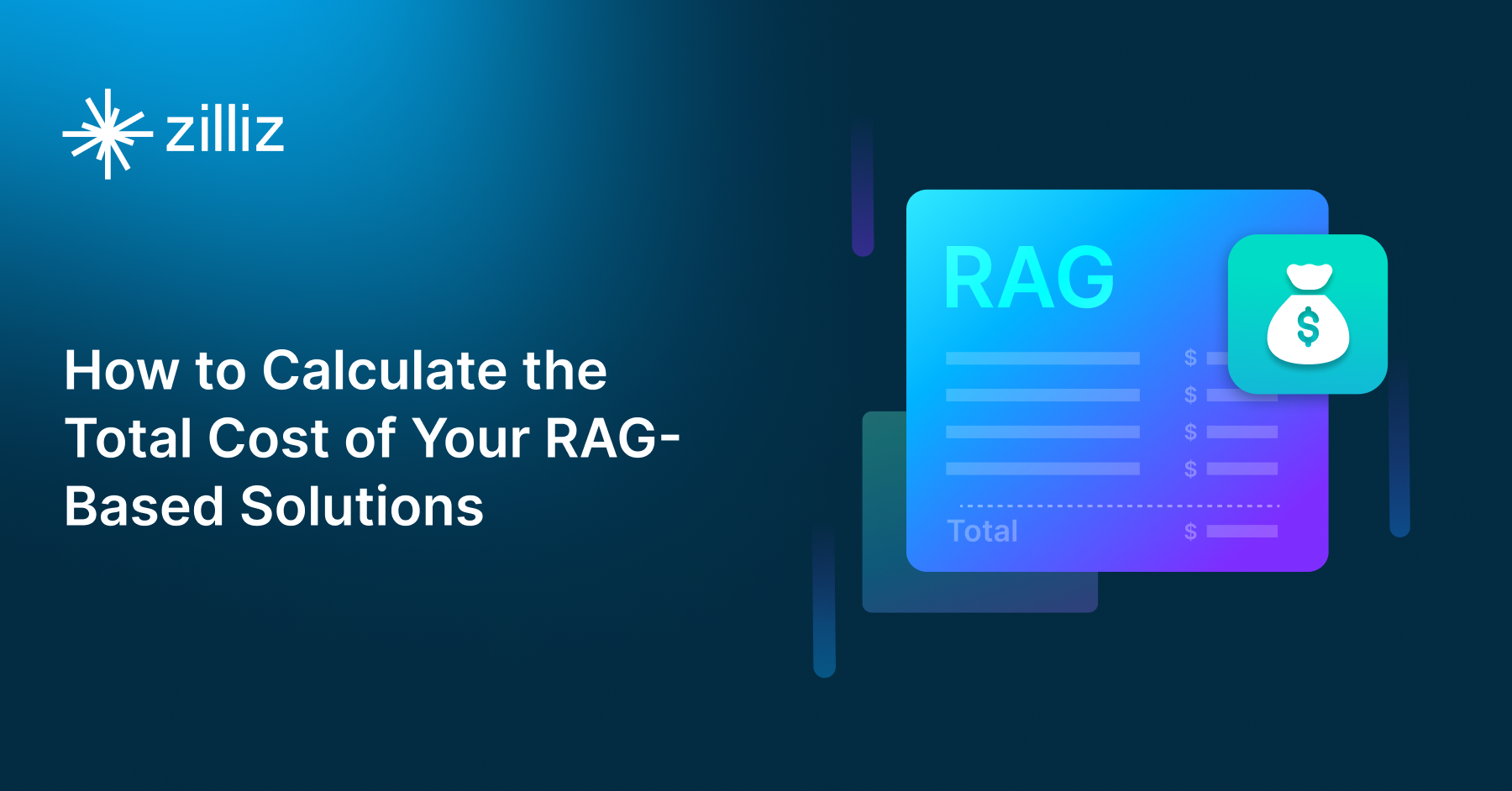Couchbase vs OpenSearch: Choosing the Right Vector Database for Your AI Apps

What is a Vector Database?
Before we compare Couchbase and OpenSearch, let's first explore the concept of vector databases.
A vector database is specifically designed to store and query high-dimensional vectors, which are numerical representations of unstructured data. These vectors encode complex information, such as the semantic meaning of text, the visual features of images, or product attributes. By enabling efficient similarity searches, vector databases play a pivotal role in AI applications, allowing for more advanced data analysis and retrieval.
Common use cases for vector databases include e-commerce product recommendations, content discovery platforms, anomaly detection in cybersecurity, medical image analysis, and natural language processing (NLP) tasks. They also play a crucial role in Retrieval Augmented Generation (RAG), a technique that enhances the performance of large language models (LLMs) by providing external knowledge to reduce issues like AI hallucinations.
There are many types of vector databases available in the market, including:
- Purpose-built vector databases such as Milvus, Zilliz Cloud (fully managed Milvus)
- Vector search libraries such as Faiss and Annoy.
- Lightweight vector databases such as Chroma and Milvus Lite.
- Traditional databases with vector search add-ons capable of performing small-scale vector searches.
Couchbase is distributed multi-model NoSQL document-oriented database and OpenSearch is an open source search and analytics suite. Both projects have vector search added on. This post compares their vector search capabilities.
What is Couchbase? An Overview
Couchbase is a distributed, open source NoSQL database for cloud, mobile, AI and edge computing. It combines the best of relational databases with the flexibility of JSON. Couchbase also allows you to do vector search even though it doesn’t have native vector indexes. Developers can store vector embeddings—numerical representations generated by machine learning models—within Couchbase documents as part of their JSON structure. These vectors can be used in similarity search use cases such as recommendation systems or retrieval-augmented generation both based on semantic search where finding data points close to each other in a high dimensional space is important.
One way to do vector search in Couchbase is by using Full Text Search (FTS). FTS is designed for text search but can be used for vector search by converting vector data into searchable fields. For example, vectors can be tokenized into text-like data and FTS can index and search based on those tokens. This will give you approximate vector search and a way to query documents with vectors that are close in similarity.
Alternatively developers can store the raw vector embeddings in Couchbase and do the vector similarity calculations at the application level. This means retrieving documents and computing metrics such as cosine similarity or Euclidean distance between vectors to find the closest matches. This way Couchbase will be used as storage for vectors and the application will handle the math.
For more advanced use cases some developers integrate Couchbase with specialized libraries or algorithms that enable vector search. These integrations allow Couchbase to manage the document store and the external libraries will do the actual vector comparisons. This way Couchbase can still be part of a solution that does vector search.
By using these approaches Couchbase can be used for vector search functionality and be a flexible option for various AI and machine learning use cases that require similarity search.
Whatis OpenSearch? An Overview
OpenSearch is a open source search and analytics platform that can handle many data types including vectors. As a full solution, it has full text search, real time data processing and advanced analytics. Its distributed architecture makes it suitable for small and large deployments across many industries.
One of the key features of OpenSearch is the vector search capabilities through the k-NN (k-nearest neighbors) plugin. This allows you to search on vector data, and opens up possibilities for advanced use cases like recommendation systems, image recognition and anomaly detection. The platform has a custom "knn_vector" field type to store and index vector embeddings efficiently.
OpenSearch has multiple ways to do vector search to accommodate different use cases and performance requirements. The approximate k-NN search using algorithms like HNSW (Hierarchical Navigable Small World) or IVF (Inverted File System) gives you high speed similarity search on large datasets, at the cost of some accuracy. For exact matches or pre-filtering use cases OpenSearch has exact k-NN search methods through scoring scripts and Painless extensions that gives you more accurate results at the cost of more computation time.
To add more to the vector search capabilities OpenSearch supports multiple engines including NMSLIB, Faiss and Lucene each with their own strengths in vector indexing and retrieval. The platform also has many configuration options so you can fine tune indexing and search parameters for your use case. Advanced features like vector compression (e.g. Product Quantization) helps to manage memory usage when dealing with high dimensional vectors. This combination of flexibility, performance and features makes OpenSearch a great tool for organizations to implement vector search in their data ecosystem.
OpenSearch and Couchbase: A Comparison for Vector Search
When choosing between OpenSearch and Couchbase for vector search, consider these key differences:
Search Methodology:
OpenSearch offers built-in vector search capabilities through its k-NN plugin, supporting both approximate and exact k-NN search methods. It uses algorithms like HNSW and IVF for efficient similarity searches.
Couchbase doesn't have native vector indexes but allows vector search through Full Text Search (FTS) or application-level computations. It can store vector embeddings within JSON documents.
Data Handling:
OpenSearch excels in handling various data types, including structured, semi-structured, and unstructured data. It has a custom "knn_vector" field type for vector embeddings.
Couchbase, as a NoSQL database, is flexible with JSON document storage. It can store vector embeddings as part of the JSON structure.
Scalability and Performance:
OpenSearch has a distributed architecture designed for scalability. Its approximate k-NN search methods offer high-speed similarity searches on large datasets.
Couchbase is also distributed and scalable. For vector search, performance depends on the chosen method (FTS or application-level computations).
Flexibility and Customization:
OpenSearch provides multiple search methods and engines (NMSLIB, Faiss, Lucene) with configurable parameters for fine-tuning.
Couchbase offers flexibility in data modeling with JSON and allows custom vector search implementations at the application level.
Integration and Ecosystem:
OpenSearch integrates well with the Elastic Stack ecosystem and supports various plugins.
Couchbase can integrate with external libraries for vector search and is part of a broader NoSQL ecosystem.
Ease of Use:
OpenSearch has built-in vector search capabilities, potentially simplifying implementation.
Couchbase might require more custom development for vector search but offers familiar NoSQL concepts.
Cost Considerations:
Both are open-source, but costs can vary based on deployment scale and potential managed service usage.
Security Features:
Both offer encryption, authentication, and access control features. Specific capabilities may differ, so check the latest documentation for detailed comparisons.
Vector Search: Couchbase or OpenSearch
When to Choose Couchbase:
Choose Couchbase when you need a NoSQL database that can handle structured and semi-structured data and vector embeddings. It’s good for applications that require strong data consistency, low latency operations and can do both traditional database operations and vector similarity search. Couchbase is a good choice if you are already using it for other parts of your application and want to add vector search without introducing a new database system. It’s useful when you need to combine vector search with complex queries on JSON data, like personalized recommendation systems or content management systems with semantic search.
When to Choose OpenSearch:
Choose OpenSearch when your primary use case is search and analytics, especially if you need built-in vector search. OpenSearch is better for use cases that need advanced full-text search, real-time data analysis and vector similarity search in one platform. It’s strong for log analytics, application monitoring and large scale recommendation systems where you need to query across multiple data types. OpenSearch is also a good choice if you need fine grained control over vector search algorithms and parameters or if you are working with high dimensional vectors and need optimized performance for similarity search across large datasets.
Conclusion:
In summary, Couchbase is a flexible NoSQL database with vector search and OpenSearch has built-in vector search and full-text search and analytics. Choose based on your use case, existing tech stack and performance requirements. Choose Couchbase if you need a database with vector search and choose OpenSearch if search functionality including vector search is core to your application. Both have their strengths so evaluate your use case in terms of data types, query patterns, scalability requirements and integration with your existing systems before making a decision.
While this article provides an overview of Couchbase and OpenSearch, it's key to evaluate these databases based on your specific use case. One tool that can assist in this process is VectorDBBench, an open-source benchmarking tool designed for comparing vector database performance. Ultimately, thorough benchmarking with specific datasets and query patterns will be essential in making an informed decision between these two powerful, yet distinct, approaches to vector search in distributed database systems.
Using Open-source VectorDBBench to Evaluate and Compare Vector Databases on Your Own
VectorDBBench is an open-source benchmarking tool designed for users who require high-performance data storage and retrieval systems, particularly vector databases. This tool allows users to test and compare the performance of different vector database systems such as Milvus and Zilliz Cloud (the managed Milvus) using their own datasets and determine the most suitable one for their use cases. Using VectorDBBench, users can make informed decisions based on the actual vector database performance rather than relying on marketing claims or anecdotal evidence.
VectorDBBench is written in Python and licensed under the MIT open-source license, meaning anyone can freely use, modify, and distribute it. The tool is actively maintained by a community of developers committed to improving its features and performance.
Download VectorDBBench from its GitHub repository to reproduce our benchmark results or obtain performance results on your own datasets.
Take a quick look at the performance of mainstream vector databases on the VectorDBBench Leaderboard.
Read the following blogs to learn more about vector database evaluation.
Further Resources about VectorDB, GenAI, and ML
- What is a Vector Database?
- What is Couchbase**? An Overview**
- Whatis OpenSearch? An Overview
- OpenSearch and Couchbase: A Comparison for Vector Search
- Vector Search: Couchbase or OpenSearch
- Conclusion:
- Using Open-source VectorDBBench to Evaluate and Compare Vector Databases on Your Own
- Further Resources about VectorDB, GenAI, and ML
Content
Start Free, Scale Easily
Try the fully-managed vector database built for your GenAI applications.
Try Zilliz Cloud for FreeKeep Reading

Creating Collections in Zilliz Cloud Just Got Way Easier
We've enhanced the entire collection creation experience to bring advanced capabilities directly into the interface, making it faster and easier to build production-ready schemas without switching tools.

Announcing the General Availability of Zilliz Cloud BYOC on Google Cloud Platform
Zilliz Cloud BYOC on GCP offers enterprise vector search with full data sovereignty and seamless integration.

How to Calculate the Total Cost of Your RAG-Based Solutions
In this guide, we’ll break down the main components of RAG costs, show you how to calculate these expenses using the Zilliz RAG Cost Calculator, and explore strategies to manage spending efficiently.
The Definitive Guide to Choosing a Vector Database
Overwhelmed by all the options? Learn key features to look for & how to evaluate with your own data. Choose with confidence.